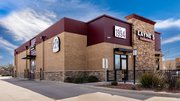Article
Putting the right spin on a PR crisis
McDonald's criticized for an employee's denied workers' comp claim after he was shot saving a customer.

February 25, 2009
It's an unfortunate fact that employees are hurt on the job. Normally, workers' compensation benefits cover medical expenses rising from those injuries, if they occur during the course and scope of employment.
But when employees go against company policy and get hurt as a result, its likely workers' compensation insurers will deny the claim. Such is the situation involving a former employee of a McDonald's in Little Rock, Ark., who now has the public's sympathy because he was shot while helping a customer.
According to news reports in the Arkansas Democrat-Gazette and on ABC News, then-employee Nigel Haskett, 22, saw a female customer being beaten by a man in the restaurant. Haskett intervened, pushed the man outside and blocked the door to keep him from returning. The man pulled out a gun and shot Haskett in the chest, hitting several internal organs, which resulted in three surgeries and $300,000 in medical bills.
The case is now before the Arkansas Workers' Compensation Commission after the McDonald's owner's workers' compensation insurance company rejected the claim, stating that Haskett's injuries did not occur in the course and scope of his employment.
Richard Fox is a New Albany, Ind.-based attorney who has represented a number of plaintiffs in workers' compensation cases and has been a speaker at workers' compensation seminars. He said the claim could be denied if Haskett's actions did indeed violate his employer's policy.
But the Arkansas commission also could apply what is known as positional-risk doctrine, which states that "an injury rises out of employment if it would not have occurred but for the fact of conditions and obligations of employment," he said.
"It's an interesting case," Fox said.
Recovering from a PR disaster
The Arkansas Times covered the workers' compensation case, painting McDonald's Corp. as the villain because its insurance company denied the claim. According to the Arkansas Times, Haskett's attorney said that McDonald's position in the matter is that employee training includes instructions for employees never to intervene in a robbery or similar occurrence, but to call 911.
Danya Proud, spokeswoman for McDonald's Corp., said the claim is not McDonald's to deny, "but it was actually through an insurance group." She said McDonald's is working with the owner/operator, but since he is a franchisee and an independent business owner, it is up to him to produce a statement.
At the time of the Times' story, McDonald's owner/operator Ray Nosler did not have a statement prepared but has since issued one:
"My highest priority is the safety and security of my customers and employees. I stand behind Nigel Haskett. I believe he acted as a Good Samaritan. Concerning the critical matter of his medical expenses, it is important to note that the Arkansas Workers' Compensation Commission ultimately decides the outcome of his claim. As part of this process, Nigel's case will be presented to a workers' compensation judge, who will review all of the facts and decide on the case's merits.
"McDonald's supports Nigel's claim, and fully anticipates the judge in this process to find in Nigel's favor. As a safeguard, if for some reason his claim is denied, and other insurance options are unavailable, I intend to cover the cost of his medical expenses.
"I'm doing this because it's the right thing to do."
Rhonda Sanderson, founder of Chicago-based public relations firm Sanderson & Associates, said that issuing such a statement quickly is important in crisis communications.
"While attorneys do limit what they can discuss (regarding pending legal matters), I would never not comment. That's the worse thing you can do," she said. "The only thing I wouldn't comment on is any kind of admission of liability."
Sanderson said such situations as the Haskett case puts employers in a difficult spot. Operators have policies in place to protect their employees and their customers, and those policies need to be followed and enforced.
But when it comes down to a public relations crisis in which the corporation or operator is depicted as inhuman and uncaring, a compassionate response is the better course of action, she said.
The corporation is faced with condoning an action that put someone in danger vs. helping an employee who has come to be regarded as a hero and now a victim.
"If I were their PR person, I would recommend they cover the bills and make a big deal of it — with the caveat that we do not encourage this behavior," Sanderson said. "It's important that they explain why they discourage this behavior while pointing out that he reacted as a human being."
Nosler's offer to pay for the expenses if they are denied by the workers' compensation commission also is a move Sanderson recommends.
"It may not be covered by worker's comp, but there are other things you can do for them," she said. "You can still express regard for his human response. The important thing is to get the public's trust again."









